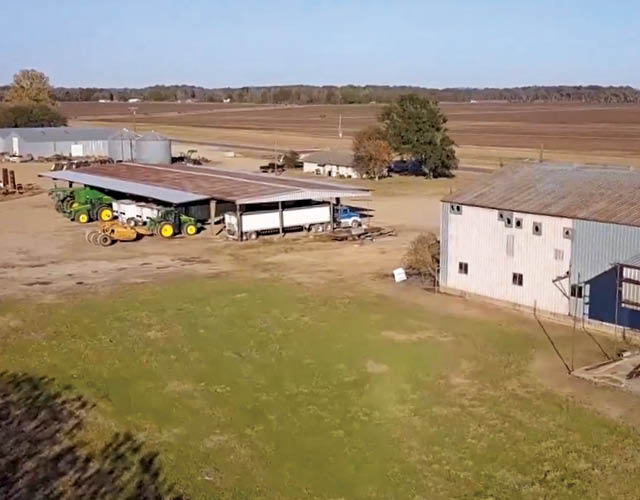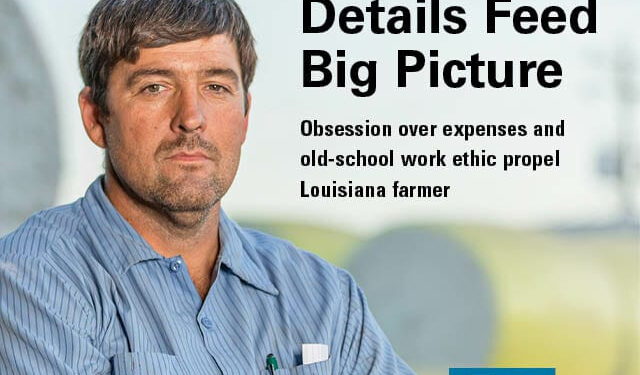Obsession over expenses, old-school work ethic propel Louisiana farmer
Sam Ross is the first into the farming fray. Look for the spot where the most work is in progress on the farm, or where a hive of activity is buzzing — and Ross will be found, leading knee-deep in the task.
“You can only lead on a farm by example,” Ross says.
Focused on team execution, strict adherence to bottom-line financials, obsession over the tiniest input expense and an old-school work ethic, Ross has built a successful, multifaceted agricultural operation. For these reasons, Ross and his team earned recognition as a finalist for the 2020 Top Producer of the Year Award.
“Sam has an unexplained inner drive to do things the right way and wants that sense of accomplishment,” says Jerry Waits, location manager of Nutrien Ag Solutions in Pioneer, La. “He seems to think out ideas from every possible angle.”
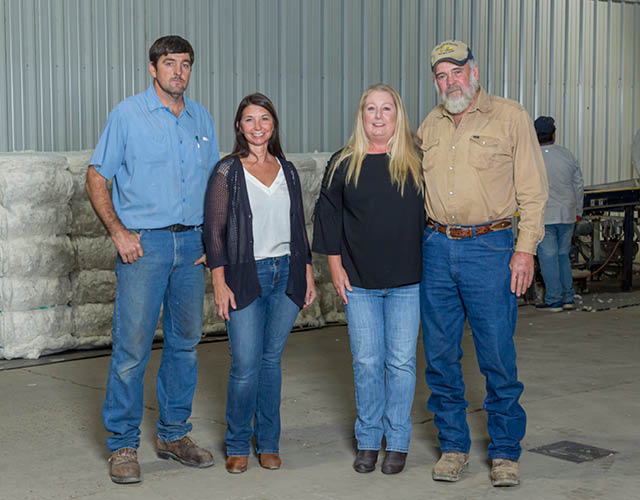
Key Players
Ross owns 1,560 acres and works almost 10,000 acres (90% irrigated) in northeast Louisiana, along with ground across the Mississippi River, in west-central Mississippi. The acreage is split into thirds of corn, cotton and soybeans.
Just before 7 a.m. each day, Ross is out the door, headed to a farmer’s magnet in Pioneer, La., — the local grocery store, where he stops for coffee, trades banter with silver-haired retirees and talks shop with his own crew.
Ross doesn’t mention his operation without emphasizing the role of several key players. Stacy, his wife, handles all input paperwork and spraying logistics. Ross’ father, Mike, is a mentor and crucial presence at the operation. Julie Ross, a cousin, is office manager for the Ross farm, gin and land leveling company, and a vital, long-time cog in the system. Marlin Franklin, is a savvy, lead operator in the field, and Jacob, Ross’ 21-year-old son, is learning the ropes in his father’s shadow.
A Focused Risk Manager
Raised in farming under Mike’s guidance, Ross bought his first 100 acres three years after high school graduation, and five years later was farming solo on 1,200 acres. In 2003, at 25, having climbed to 2,000 production acres, Ross had the chance to make a career-changing leap to 9,000 acres.
Essentially, Ross used crop insurance as a spending cap to farm acres at a profitable level. When Jimmy Sanders Inc. offered in-house
financing up to crop insurance, Ross knew the setup would cash flow — provi-ded his spending stayed below the cap.
It was a moment of reckoning for Ross: “I realized as long I could keep expenses to that set amount, I couldn’t lose. Why not go for it? It took some of the scare out of the situation, and at the time, I had very little equity, and I had little to lose.”
This financial strategy required heavy discipline, and although it didn’t allow him to high-end farm, it provided a solid foothold.
“It made me farm the best I could with a certain amount of money,” Ross says. “What I’m trying to do is always focus on ROI, whether I’m negotiating leases with a landowner or corporate-owned landholder.”
By 2009, confident in his risk management formula, Ross began widespread equipment leasing. Particularly across an operation with an 80-mile radius, leasing ensured less downtime for repairs, faster job completion with larger ma-chines, and access to updated technology.
“The key was volume,” he says, “and once I hit 8,000 acres, I was able to get a better pricing schedule and get multi-unit discounts. It’s good for me and the dealers.”
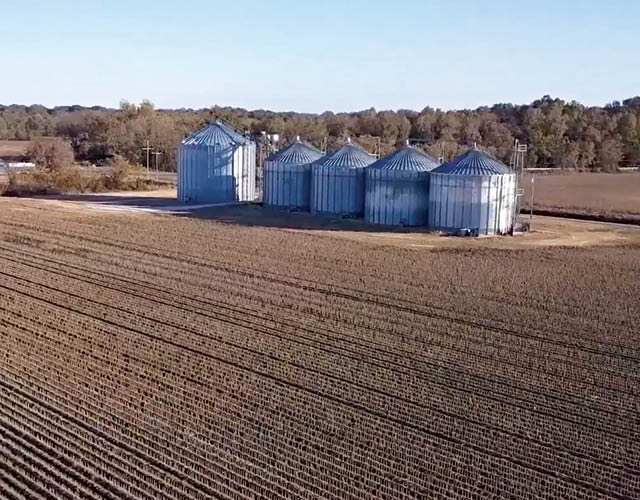
Building Blocks of the Business
The transition to leasing opened another door in 2012: the purchase of a 330,000-bu. grain storage facility, using money generated through the sale of existing equipment. Ross then moved away from traditional banking and transitioned to Rabobank. Further, in 2016, he leased a previously closed gin, Carroll Gin, which he bought in 2018.
“When a gin closes, it is almost impossible to start one back up,” says Bobby Skeen, Louisiana Cotton & Grain Association. “For them to come put in their time and money to get it back up and going is huge.”
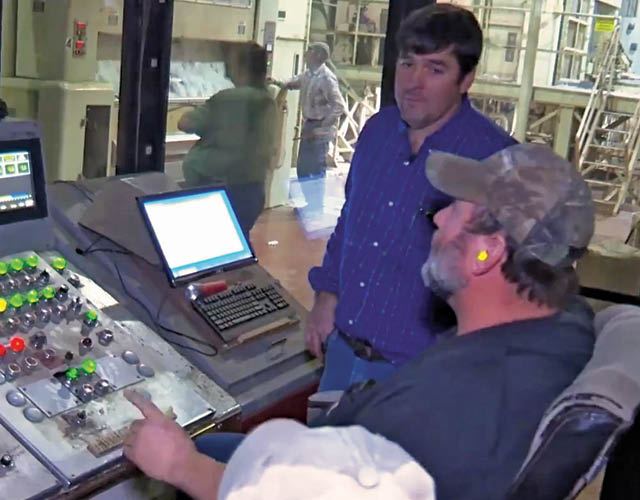
Over the past decade, the Ross team has exercised a laser focus on inputs and expenses. Stacy, a former banker, is the conductor of a paperwork and digital symphony, using Granular to keep track of inputs, chemical prices, field logis-tics and cover crop plans.
“Stacy coordinates our spraying,” Ross says. “I’ll tell her what we want to do in the field, and she prices the products and conveys it on to Marlin or the ground service or flying service.”
The extreme attention to input costs across 10,000 acres pays major dividends, Ross contends, and exposes no-return fields and the hazards of non-irrigated land.
“Keeping track of every little expense means we know exactly where we’re making money. As farmers, we think we know, but the numbers often say different. Stacy is able to evaluate the expenses on every field. As a result, I’ve let land go because we weren’t making money on it.”
Pass on Wisdom
Currently, Ross aims to move toward increased ownership of land, but says the goal is tough to achieve. “I’d like to get so much more paid for and not so much leasing, but land values keep going up. It’s all part of the farming chal-lenge that I love.”
With more than 20 years under his belt, Ross’ goal is to mentor and coach his son, as well as share his knowledge with other young farmers — helping them avoid some of the mistakes he’s made.
He says spending in the wrong area is a common error of today’s young growers: “Young guys sometimes have a hard time keeping their finger out of the cookie jar. They get a crop loan and start buying things they shouldn’t, or spending an extra $30,000 on hunting leases or extravagant vehicles. No, just take care of base payments.”
An ardent believer in community and conservation, Ross also emphasizes the value of mentorship. “My own dad taught me that hard work was not a bad thing. In fact, my grandpa and uncles all did the same, and showed me work was a part of life.”
For young growers, Ross offers plain advice: “Look around your community and see who is successful, and then watch what they’re doing. I guarantee they’re making the right decisions and not letting chance take over.”
In his 20s, Ross farmed acreage in Bolivar County, Miss., and learned valuable life lessons from neighboring produc-er Travis Satterfield. “He was never frustrated or in a hurry. I watched him farm 4,000 acres of rice and not get stressed out. That was the guy I wanted to be.”
Ross will continue to maintain hyper-focus on input numbers, data and ROI — all the while keeping an old-school approach to farming.
“Leadership is showing consistency on your operation, and that means showing people by example,” he says. “I’ll be there every morning with the first ones to arrive. In the field, wherever the most important work is going on, that’s where you’ll find me.”
Snapshot Of Ross Planting Company
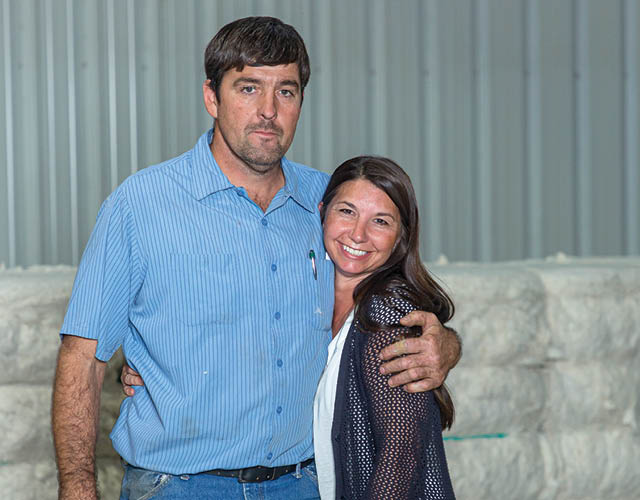
Operation: Headquartered in Pioneer, La., Ross Planting Company spans 10,300 acres on both sides of the Louisiana-Mississippi line. The crop mix includes corn, soybeans and cotton. In 2018, Ross bought an area gin.
Family: Sam Ross and his wife, Stacy, own the operation. Other partners include Jacob Ross, Sam’s son, and Mike Ross, Sam’s father.
Team: The farm employs eight full-time and 10 part-time team members. Ross evaluates employ-ees’ strengths and weaknesses to determine the best role they will play in the business. They also recruit through the H-2A program.
Community: The Ross family gives back to their local area. They assist with firework displays and tree lighting programs. They donate guided hunts for disabled war veterans through the Wounded Warrior Project. Ross also coaches peewee basketball, one of his favorite hobbies.
